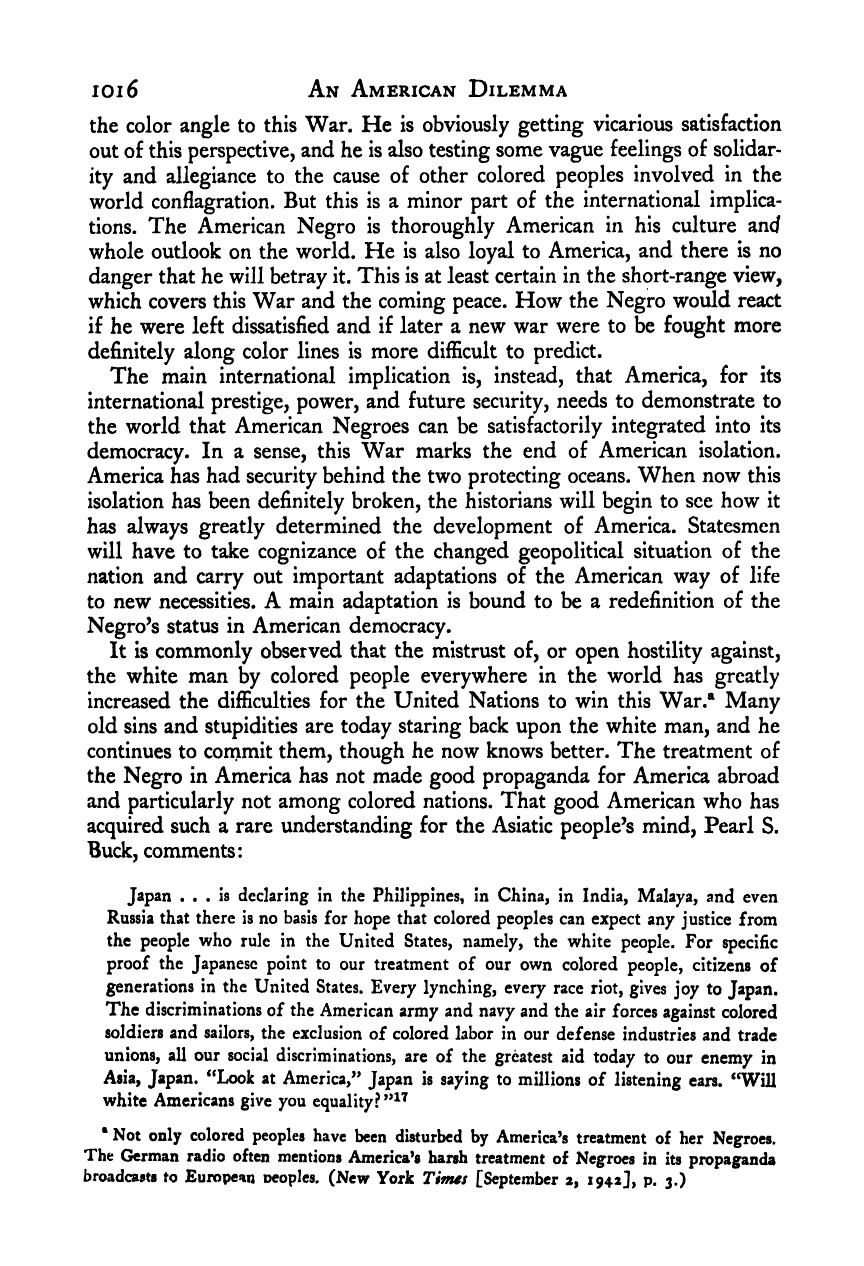Note: Gunnar Myrdal died in 1987, less than 70 years ago. Therefore, this work is protected by copyright, restricting your legal rights to reproduce it. However, you are welcome to view it on screen, as you do now. Read more about copyright.
Full resolution (TIFF) - On this page / på denna sida - XI. An American Dilemma - 45. America Again at the Crossroads in the Negro Problem - 8. International Aspects

<< prev. page << föreg. sida << >> nästa sida >> next page >>
Below is the raw OCR text
from the above scanned image.
Do you see an error? Proofread the page now!
Här nedan syns maskintolkade texten från faksimilbilden ovan.
Ser du något fel? Korrekturläs sidan nu!
This page has never been proofread. / Denna sida har aldrig korrekturlästs.
ioi6 An American Dilemma
the color angle to this War. He Is obviously getting vicarious satisfaction
out of this perspective, and he is also testing some vague feelings of solidar-
ity and allegiance to the cause of other colored peoples involved in the
world conflagration. But this is a minor part of the international implica-
tions. The American Negro is thoroughly American in his culture and
whole outlook on the world. He is also loyal to America, and there is no
danger that he will betray it. This is at least certain in the short-range view,
which covers this War and the coming peace. How the Negro would react
if he were left dissatisfied and if later a new war were to be fought more
definitely along color lines is more difficult to predict.
The main international implication is, instead, that America, for its
international prestige, power, and future security, needs to demonstrate to
the world that American Negroes can be satisfactorily integrated into its
democracy. In a sense, this War marks the end of American isolation.
America has had security behind the two protecting oceans. When now this
isolation has been definitely broken, the historians will begin to see how it
has always greatly determined the development of America. Statesmen
will have to take cognizance of the changed geopolitical situation of the
nation and carry out important adaptations of the American way of life
to new necessities. A main adaptation is bound to be a redefinition of the
Negroes status in American democracy.
It is commonly observed that the mistrust of, or open hostility against,
the white man hy colored people everywhere in the world has greatly
increased the difficulties for the United Nations to win this War.® Many
old sins and stupidities are today staring back upon the white man, and he
continues to conimit them, though he now knows better. The treatment of
the Negro in America has not made good propaganda for America abroad
and particularly not among colored nations. That good American who has
acquired such a rare understanding for the Asiatic people’s mind. Pearl S.
Buck, comments:
Japan ... is declaring in the Philippines, in China, in India, Malaya, and even
Russia that there is no basis for hope that colored peoples can expect any justice from
the people who rule in the United States, namely, the white people. For specific
proof the Japanese point to our treatment of our own colored people, citizens of
generations in the United States. Every lynching, every race riot, gives joy to Japan.
The discriminations of the American army and navy and the air forces against colored
soldiers and sailors, the exclusion of colored labor in our defense industries and trade
unions, all our social discriminations, are of the greatest aid today to our enemy in
Asia, Japan. “Look at America,” Japan is saying to millions of listening ears. “Will
white Americans give you equality?
* Not only colored peoples have been disturbed by America’s treatment of her Negroes.
The German radio often mentions America’s harsh treatment of Negroes in its propaganda
broadcasts to European oeoples. (New York Times [September 2, 1942], p. 3.)
<< prev. page << föreg. sida << >> nästa sida >> next page >>